Foraging mullein offers you a powerful natural remedy for lung health. Known as the "lung herb," it helps reduce inflammation and eases airway irritation. Mullein also acts as an expectorant, making it easier to expel mucus from the lungs. Plus, its antimicrobial properties can help combat respiratory infections. With its tall leaves and distinctive yellow flowers, mullein is usually found along roadsides and in disturbed areas. When you brew mullein tea, you're tapping into its wellness benefits while enjoying a soothing beverage. The benefits don't stop there—discover how to enhance your tea experience with other herbal allies for respiratory support.
Benefits of Mullein for Lungs
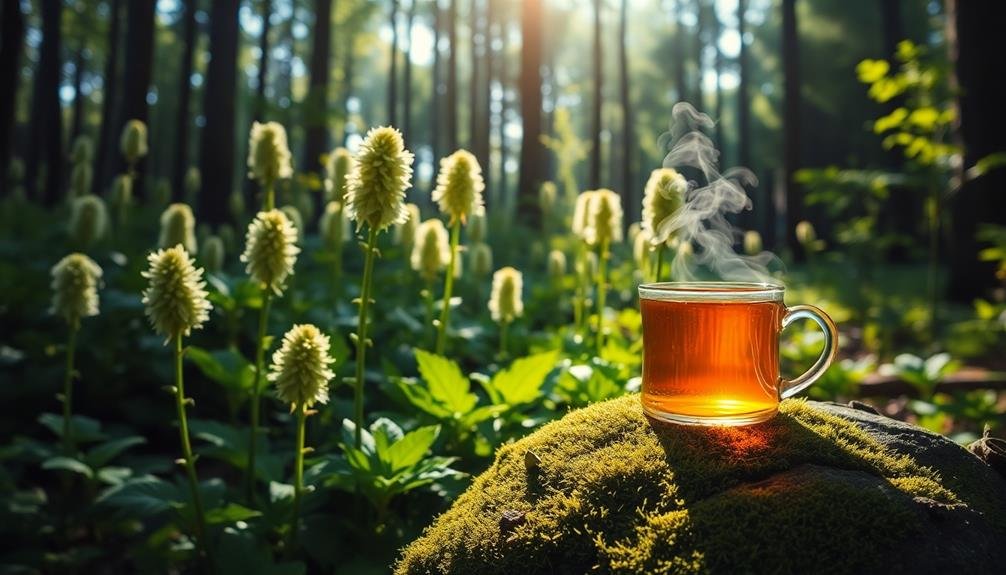
Mullein, often called the "lung herb," offers a range of benefits for respiratory health. When you incorporate mullein into your herbal tea routine, you're tapping into its soothing properties that can alleviate various lung-related issues.
This herb is known for its ability to reduce inflammation, which can help ease irritation in your airways. If you're dealing with a cough or bronchial congestion, mullein can act as a natural expectorant, helping you expel mucus more effectively.
You might also find that mullein aids in relieving symptoms of respiratory infections. Its antimicrobial properties can support your body's defenses, making it a great ally during cold and flu season.
Plus, the gentle nature of mullein makes it suitable for a wide range of users, from children to adults.
Identifying Mullein in the Wild
When exploring the outdoors, spotting mullein can be an exciting challenge for herbal enthusiasts. This biennial plant usually grows in disturbed areas, like roadsides and fields, making it more accessible than you might think.
Look for tall, leafy stalks that can reach up to six feet high. Mullein's distinctive, fuzzy leaves are large, often growing up to a foot long, and they form a rosette close to the ground in the first year.
As you search, pay attention to the flowers. In its second year, mullein produces a tall spike adorned with small, yellow flowers that bloom from the bottom upward. These blooms are a telltale sign you've found the right plant.
Mullein's leaves are soft to the touch, with a gray-green hue that sets them apart from other foliage. Be mindful that it can resemble other plants, but the combination of its height, leaf shape, and flowering spike makes it unique.
Always take a moment to appreciate the plant's habitat, as healthy mullein often grows near other beneficial herbs.
With practice, you'll become adept at recognizing this valuable lung-supporting herb in the wild.
Sustainable Foraging Practices
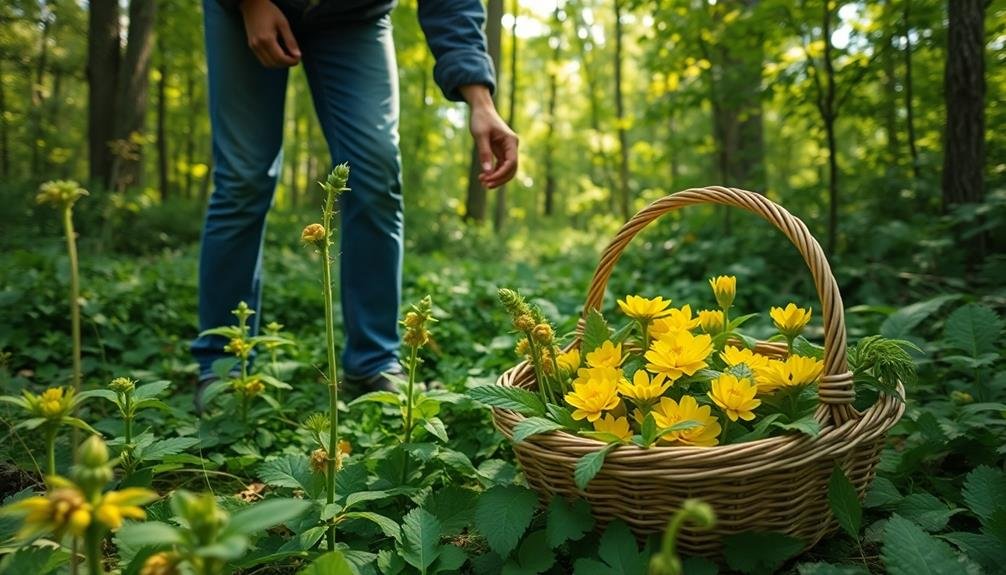
Practicing sustainable foraging guarantees that you can enjoy the benefits of mullein while preserving its natural habitat for future generations. To forage responsibly, you need to follow some key principles. First, only take what you truly need. This helps maintain healthy populations of mullein in the wild.
Next, be mindful of the area where you're foraging. Avoid overharvesting in a single location, and consider rotating your foraging spots. This allows plants a chance to recover and thrive. Finally, be aware of the environmental impact. Stick to well-established trails to prevent damaging the surrounding ecosystem.
Here's a quick reference table for sustainable foraging practices:
| Practice | Description |
|---|---|
| Harvest selectively | Take only a few leaves or flowers at a time. |
| Rotate foraging locations | Forage different areas to allow recovery. |
| Observe local guidelines | Follow regulations on foraging in public lands. |
Preparing Mullein Herbal Tea
After foraging responsibly for mullein, you can enjoy its many benefits by preparing a soothing herbal tea. Start by selecting the right parts of the plant: the leaves are the most commonly used. Make sure they're clean and free from any pests. Rinse them gently under cool water to remove any dirt.
Next, chop the leaves into smaller pieces to release their properties. Boil about two cups of water in a pot, and once it's bubbling, add roughly one to two tablespoons of the chopped mullein leaves. Let the mixture steep for about 10-15 minutes. This allows the beneficial compounds to infuse into the water.
After steeping, strain the tea through a fine mesh sieve or cheesecloth to remove the plant material. You can sweeten your tea with honey or add lemon for extra flavor, but it's perfectly enjoyable on its own.
Sip your mullein tea slowly, and let its soothing properties work their magic. Enjoy this comforting drink, especially during the colder months or when you need a little respiratory support.
You'll appreciate the effort you put into foraging and preparing this herbal remedy.
Other Herbal Allies for Respiratory Health
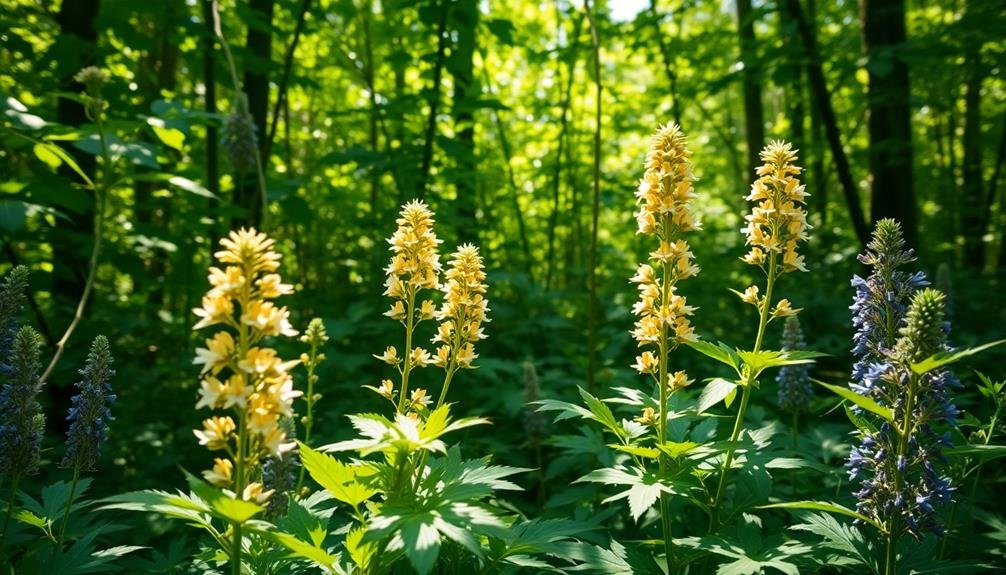
A variety of herbal allies can enhance your respiratory health alongside mullein. For instance, slippery elm is known for its soothing properties, helping to alleviate coughs and throat irritation. You can brew it as a tea or mix it into your mullein infusion for added benefits.
Another excellent option is thyme, which has antimicrobial properties that support lung health. Thyme tea can help clear mucus and ease congestion, making it a powerful ally during cold and flu season.
Don't overlook peppermint, either. Its menthol content opens airways and promotes easier breathing. A cup of peppermint tea can be invigorating and revitalizing, especially when you're feeling under the weather.
Lastly, consider adding elderflower to your herbal arsenal. It's packed with antioxidants and can help reduce inflammation in the respiratory system. You can easily incorporate it into your mullein tea for a tasty and healthful blend.
Frequently Asked Questions
Can Mullein Tea Help With Chronic Bronchitis Symptoms?
Yes, mullein tea can help alleviate chronic bronchitis symptoms. It soothes irritation, reduces inflammation, and may promote easier breathing. Incorporating it into your routine could offer some relief and support your respiratory health.
Is Mullein Safe for Children and Pregnant Women?
Mullein's generally considered safe for children and pregnant women, but it's essential to consult a healthcare professional first. Each individual's health varies, so getting personalized advice guarantees safety and effectiveness for your specific needs.
How Often Can I Drink Mullein Herbal Tea?
You can enjoy mullein herbal tea daily, but it's wise to start slow. If you're new to it, try a cup every other day and adjust based on how your body responds.
Are There Any Side Effects of Consuming Mullein?
Mullein's generally safe, but you might experience mild side effects like digestive upset or allergic reactions. Always consult your healthcare provider before adding it to your routine, especially if you're pregnant or on medication.
How Does Mullein Compare to Other Lung-Supporting Herbs?
Mullein stands out among lung-supporting herbs for its soothing properties and anti-inflammatory effects. Unlike others, it's gentle on the respiratory system, making it a great choice if you're seeking natural relief for respiratory issues.
In Summary
Foraging for mullein can be a rewarding way to support your lung health naturally. By identifying this beneficial herb in the wild and practicing sustainable foraging, you'll not only nourish yourself but also respect the environment. Preparing a soothing mullein tea can provide comfort and relief for respiratory issues. Plus, pairing it with other herbal allies enhances its effects. So, grab your foraging basket and enjoy the journey of connecting with nature while boosting your well-being!


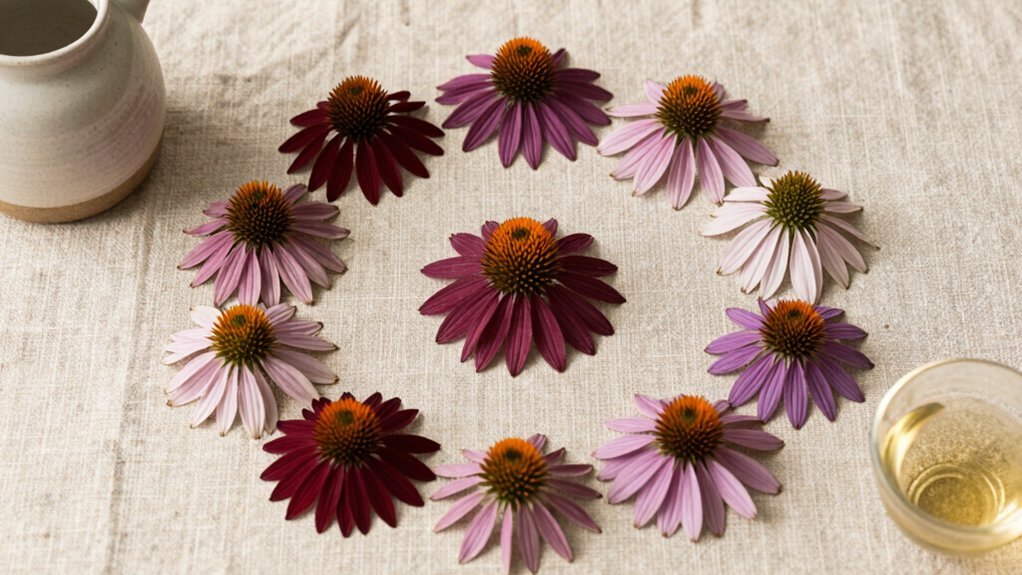
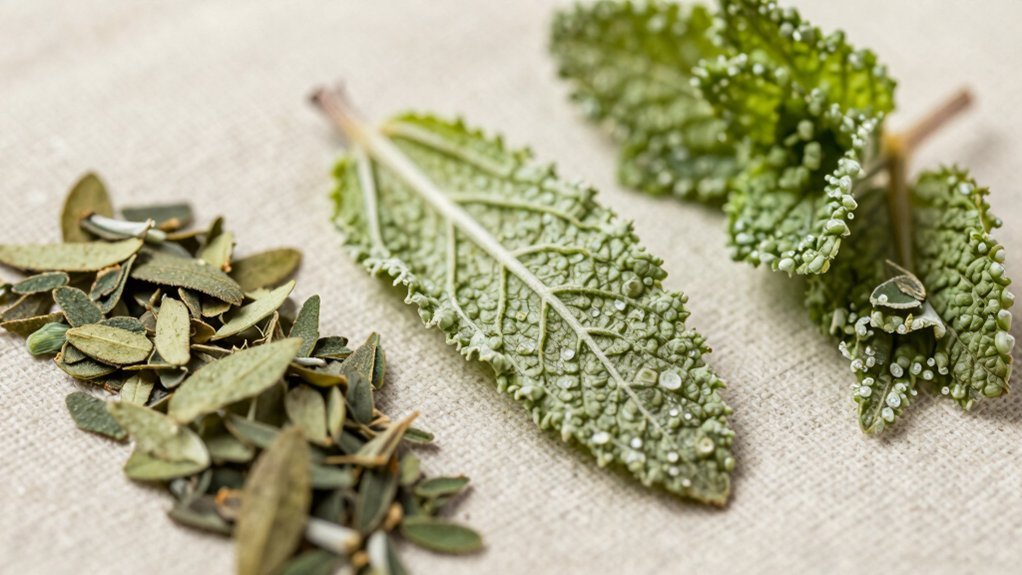

Leave a Reply